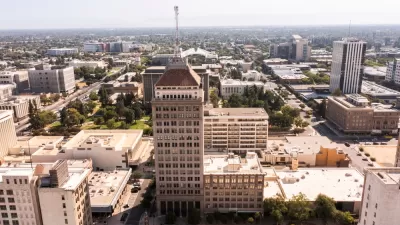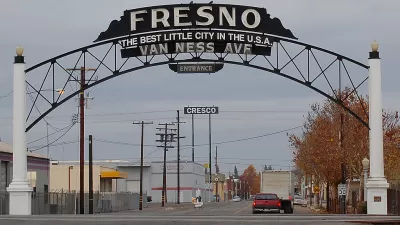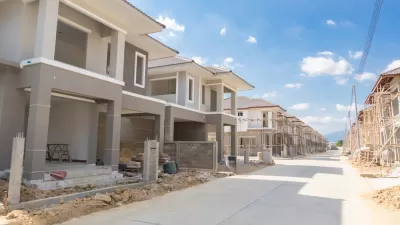The document outlines 47 policies aimed at maintaining affordability and encouraging more housing production in the increasingly expensive Central Valley city.

“Over the span of the pandemic, Fresno became one of the hottest housing markets in the country – leaving many households unable to keep up with the cost of the historically affordable city.” As Cassandra Garibay and Danielle Bergstrom report, this set the stage for a new housing strategy from Mayor Jerry Dyer that seeks to improve affordability in the city.
The One Fresno Housing Strategy “includes 47 priority policies, which focus on building more affordable housing, but also on loosening restrictions for developers to build more market-rate housing – historically clustered in single-family subdivisions on the fringe of the city. The plan offers 24 additional policies to address homelessness.”
A report called Here to Stay from the Thrivance Group “says that the city has over-built the number of single-family homes by over 28,000 houses,” adding that the city needs:
- “21,001 homes for renters who cannot afford more than $500 a month in order to not be cost burdened”
- “7,139 additional homes that serve renters who can afford $500 to $1,000 a month.”
- “More than 2,500 additional emergency shelter beds.”
- “An additional 2,500 micro-homes to meet the needs of the unsheltered community.”
According to the article, “The mayor’s housing strategy sets a goal of building, preserving, or rehabilitating 6,926 affordable homes and encouraging the development of 4,110 market-rate homes over the next three years.” The plan also includes elements that “encourage the transition of 8,000 single family home rentals into affordable homeownership options.”
The housing plan breaks the 47 policies into four categories – preserving housing, producing housing, preventing displacement and promoting equity. The strategy relies heavily on incentivizing the production and rehabilitation of affordable housing – through grants, loans, or loosening restrictions on building all types of housing, rather than firm regulations such as rent control – to achieve desired housing production and affordability goals.
The article details the policies proposed by the Mayor, such as inclusionary zoning, raising the city’s housing trust fund, and continuing eviction protections and other current programs.
FULL STORY: Mayor releases $259 million ‘One Fresno Housing Strategy.’ Here’s what you need to know

Alabama: Trump Terminates Settlements for Black Communities Harmed By Raw Sewage
Trump deemed the landmark civil rights agreement “illegal DEI and environmental justice policy.”

Study: Maui’s Plan to Convert Vacation Rentals to Long-Term Housing Could Cause Nearly $1 Billion Economic Loss
The plan would reduce visitor accommodation by 25% resulting in 1,900 jobs lost.

Planetizen Federal Action Tracker
A weekly monitor of how Trump’s orders and actions are impacting planners and planning in America.

Wind Energy on the Rise Despite Federal Policy Reversal
The Trump administration is revoking federal support for renewable energy, but demand for new projects continues unabated.

Passengers Flock to Caltrain After Electrification
The new electric trains are running faster and more reliably, leading to strong ridership growth on the Bay Area rail system.

Texas Churches Rally Behind ‘Yes in God’s Back Yard’ Legislation
Religious leaders want the state to reduce zoning regulations to streamline leasing church-owned land to housing developers.
Urban Design for Planners 1: Software Tools
This six-course series explores essential urban design concepts using open source software and equips planners with the tools they need to participate fully in the urban design process.
Planning for Universal Design
Learn the tools for implementing Universal Design in planning regulations.
Caltrans
Smith Gee Studio
Institute for Housing and Urban Development Studies (IHS)
City of Grandview
Harvard GSD Executive Education
Toledo-Lucas County Plan Commissions
Salt Lake City
NYU Wagner Graduate School of Public Service




























